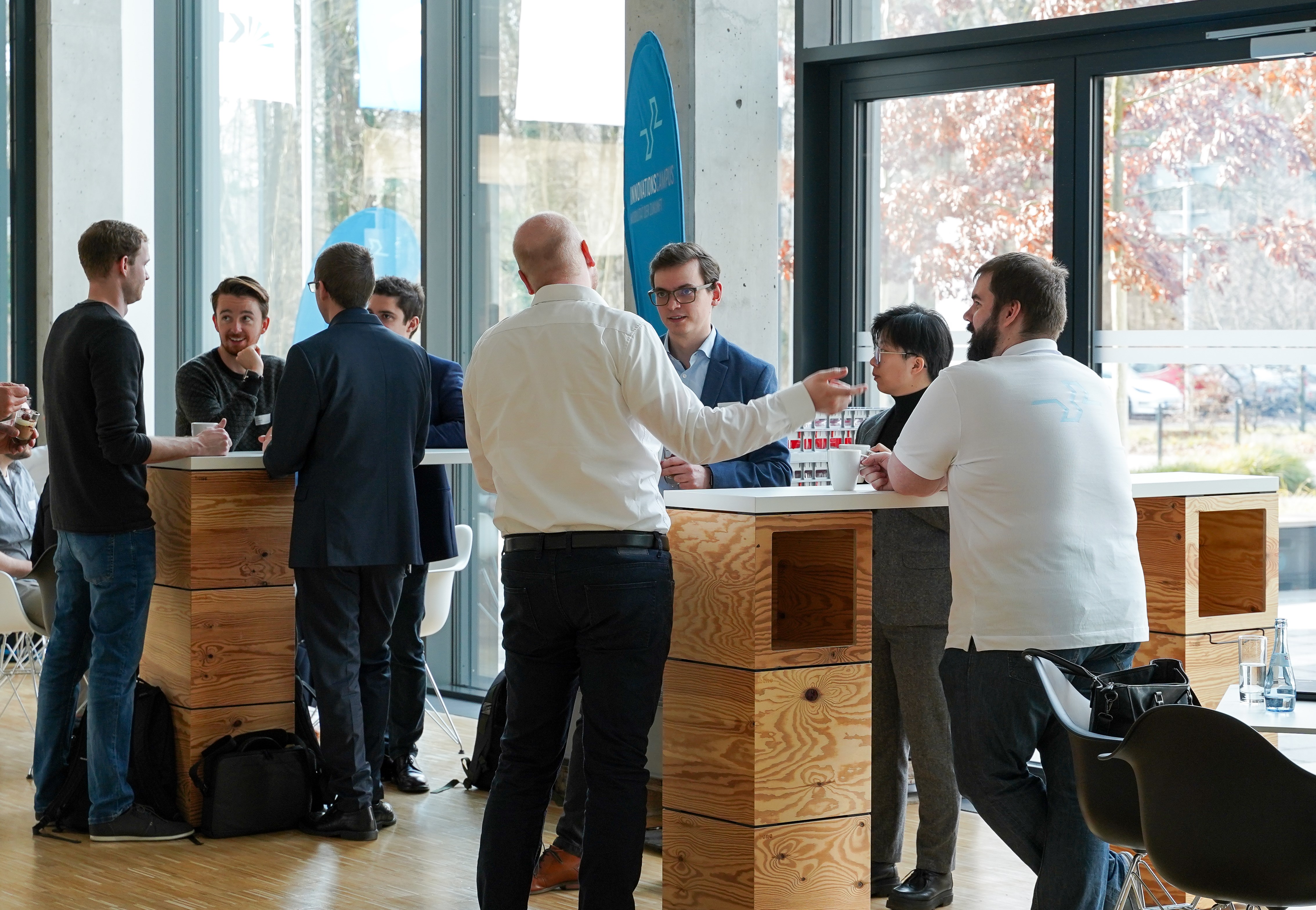Usually paintings, jewels or pieces of jewelry are auctioned, but rarely the innovations of the future. Except at the InnovationChallenge Sustainable Production and Mobility of the InnovationCampus Future Mobility (ICM). Which research partnerships from companies and universities from Baden-Württemberg would receive funding from the Ministry of Science, Research and Arts (MWK) was decided only after a total of three bidding rounds. In the end, eleven consortia emerged. Starting in May, they will work together to find solutions to the research questions posed by the companies in the field of sustainable production and mobility.

ICM InnovationChallenge 2023 – Auction table for the innovations of the future
ICM and MWK establish research partnerships between companies and university institutes - including state funding of around 1.4 million euros.

"The InnovationChallenge is an example of successful transfer between academia and companies that enables the solutions and innovations on which science and industry in Baden-Württemberg can build in the future. After having funded seven projects in 2021, this funding programme benefits again from its agile process which allows to support eleven new collaborations between our universities and companies in Baden-Württemberg", says Petra Olschowski, Minister for Science, Research and Arts.
Companies from Baden-Württemberg submit their challenges from practice as an open research question to the universities in the state. The condition in this round was that possible solutions contribute to the development of resource-efficient and sustainable mobility solutions and production technologies. The researchers presented their solution approaches to company representatives at a hackathon at the Karlsruhe Institute of Technology (KIT) on February 16. In 19 pitches, research groups from three universities competed for the challenges submitted by the companies.
Eleven consortia of research groups and companies qualified with their project plans. For the subsequent bidding process, the companies were required to make a minimum contribution of 5,000 euros. In the second and third rounds, the companies then successively increased their bids and in all eleven consortia achieved an entrepreneurial contribution that enabled the project work to be funded by the Ministry of Science, Research and Arts. The ranking was determined not only by the amount of the company’s own contribution, but also by the number of employees in the company. "This means that smaller companies or start-ups in particular benefit from our InnovationChallenge, which usually have fewer R&D capacities or even no professional innovation and funding management themselves," says Dr. Max Hoßfeld, Managing Director of the ICM. The format is uncomplicated, fast and unbureaucratic: Only two months passed between the start of the process and the announcement of the funded projects on March 16. The research work is already scheduled to start at the beginning of May.
The projects focus on resource-efficient, sustainable and digitalized production technologies for production. Research is being carried out, for example, on transport robots that autonomously deliver goods to stationary robots at precisely the right time, augmented reality applications that can be used to optimize assembly planning, or innovative quality control based on artificial intelligence (AI) for more stable laser cutting. In the end, the results should not only provide a solution for the specific problem of the participating companies and thus strengthen their competitiveness, but also generally advance research in the area covered. In this case, the future will not be long in coming. When the funding for the research partnerships expires after 18 months, the results must be ready.
These consortia will receive funding by the ICM InnovationChallenge 2023:
- Dausinger + Giesen GmbH and Institut für Strahlwerkzeuge IFSW of the University of Stuttgart with the project "Multipass amplifier: Kilowatt disk laser multipass amplifier with picosecond pulses and high repetition rate"
- Precitec GmbH & Co KG and Institut für Strahlwerkzeuge IFSW of the University of Stuttgart with the project "CutAIye: Innovative AI-based quality control for more stable laser cutting in electromobility"
- robomotion GmbH and Institute of Mechanical Handling and Logistics IFT of the University of Stuttgart with the project "RoboKoop: Autonomous mobile robots in cooperation with stationary robots"
- OTEC Präzisionsfinish GmbH and wbk Institute of Production Science of KIT with the project "Automation of the dip-grinding process by a process-integrated optical system for AI-supported analysis of value piece surfaces and geometries for increased sustainability and process reliability in production"
- ISCAR Germany GmbH and wbk Institute of Production Science of KIT with the project "AddWRaP: Additive manufacturing of tool steel with the aim of roughness reduction by alternative particle size distribution"
- Arthur Klink GmbH and wbk Institute of Production Science of KIT with the project "AddBroach: Sustainable manufacturing of near-net-shape semi-finished products by means of binder jetting using the example of broaching tools"
- SADEN GmbH and wbk Institute of Production Science of KIT with the project "AddDEM: Characterization of technical powders for cross-scale modeling of particle processes, using the example of metallic additive manufacturing"
- Semorai GmbH and IPEK Institute of Product Engineering of KIT with the project "KIIng: Industry-wide data basis for AI-based engineering services"
- Max Hauser Süddeutsche Chirurgiemechanik GmbH and wbk Institute of Production Science of KIT with the project "RoTraCut: Rotational Unround Turning of Rotor Shafts for Electric Traction Drives"
- IILS mbH und Institute of Aircraft Design IFB of the University of Stuttgart with the project "TOP2CAD: Generation of clean parametric CAD models from topology optimization results"
- Assemblio GmbH and IPEK Institute of Product Engineering of KIT with the project "AssemblAR: Optimization of assembly planning by innovative AR solutions"
Further information: www.innovationchallenge.icm-bw.de
Contact
Matthias Vollat
Transfer Manager, InnovationCampus Future Mobility
innovationchallenge(at)icm-bw.de
Editor:
Benjamin Büchner
Editor and Public Relations, InnovationCampus Future Mobility
benjamin.buechner(at)ifsw.uni-stuttgart.de